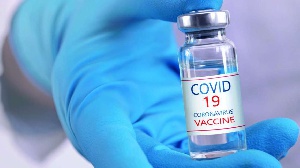 South Africa will remain on virus alert level 3
South Africa will remain on virus alert level 3
South African President Cyril Ramaphosa said the government has secured millions more doses of coronavirus vaccines as he extended a ban on alcohol sales and restricted cross-border travel to curb the spread of the disease.
The country will remain on virus alert level 3, Ramaphosa said Monday in a televised address. Land-border posts will be closed to most travelers until Feb. 15, public gatherings other than funerals won’t be allowed, and a nationwide curfew will be enforced from 9 p.m. to 5 a.m.
“The pandemic in our country is now at its most devastating,” Ramaphosa said. “We must unite to overcome the grave and persisting crisis our country faces.”
The pandemic and restrictions imposed to contain it have devastated Africa’s most industrialized economy, and the extension of curbs that came into effect at the height of the holiday season bode ill for efforts to engineer a rebound. The economy is estimated by the government to have contracted the most in nine decades last year.
Varying restrictions on alcohol sales have been implemented since an initial lockdown was imposed in late March, helping lower hospital admissions from vehicle accidents and alcohol-related violence. An prohibition introduced on Dec. 28 that was due to end on Jan. 15 will remain in place, Ramaphosa said.
Vaccine Plans
Most of the 20 million vaccine doses the government has secured will arrive in the first half of this year, the president said. He didn’t provide details of the additional supply deals, saying they would be revealed once negotiations are concluded.
The government last week announced it had struck a deal for an initial 1.5 million doses of a vaccine developed by AstraZeneca Plc and the University of Oxford from The Serum Institute of India Ltd., with first shipments set to arrive this month. It will aim to inoculate two-thirds of the population by the end of the year.
“We are exploring all avenues to get as many vaccine doses as soon as possible,” Ramaphosa said on Monday.
The announcement will help blunt criticism the government has faced from labor unions and health professionals over its slow progress in procuring vaccines, even as more than 40 other countries start their inoculation programs.
‘Positive Progress’
“The tentative progress in securing vaccine orders appears positive,” the Congress of South African Trade Unions, the nation’s biggest labor federation, said in a statement. “We will only be convinced when we see the vaccines being delivered, transported and dispensed.”
South Africa, which has detected a second and more infectious strain of the virus known as 501.V2, has reported more than 119,000 new infections since January 1, bringing the cumulative total to more than 1.23 million.
“If anything, the new variant means we must be more vigilant and diligent,” Ramaphosa said. “We must never see ourselves as being totally helpless. Our actions do have an impact on the direction and extent of the disease.”